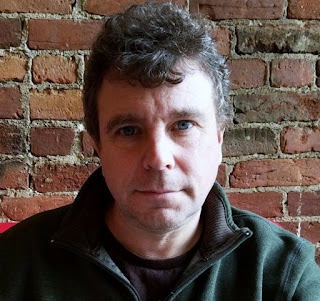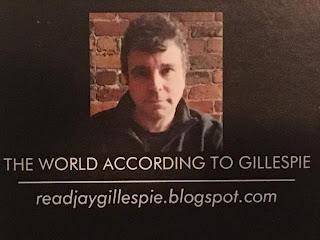SAILING INTO A LIFE WITH COFFEE
This column originally appeared on Wicked Local.
This column originally appeared on Wicked Local.
Sail
Boston was coming
to town July 10th through the 12th in 1992. I
remember because I picked up one of those promotional posters on the street
that would commemorate the event and would, one day (as in now), be incredibly
valuable. This beautifully framed Sail Boston poster
is still in my possession. I know this because each time I open my
storage closet at work I have to move it aside while trying to find something
imminently more valuable, like my Banjo for Dummies book.
My
girlfriend and I were leaving town to avoid the crowds. We were
living in the North End, and as is often the case, most city people were happy
to leave it whenever an event like this caused people from the suburbs to
infiltrate, waiting in never-ending lines to charmingly dine on over-priced
pasta.
I
made special plans for us to stay at the Woodstock Inn in New Hampshire. It
was a bed and breakfast, which meant that as soon as we entered, we were
enthusiastically welcomed by the proprietors. This was my first stay
at a real bed and breakfast, so I found the whole experience to be rather
awkward – as in, I was forced to pretend that I was interested in socializing
with complete strangers, which I wasn’t. I quickly
warmed up to the idea when I realized that these people would be responsible
for feeding me during our stay.
We
woke up the next morning and got ready for breakfast. This meant
preparing myself to engage in more “inane banter” (thank you, Russ Kenn) with
random people that I was hesitant about knowing any better than I already did
from the night before. The worst part was that the only beverage
they served with breakfast was coffee. Coffee? I didn’t
drink coffee! I was only 24 years old. My significant
other looked at me with that gaze that women give men when they know they are
about to cause a really stupid scene in public when something is not going
their way even though it is, in the grand scheme of things, remarkably minor
and largely unimportant. And besides, she told me that I would
probably end up liking it. I did what I had to do. Morphing
somewhat against my will into true adulthood, I acquiesced and politely said,
“I’ll have the coffee, please.” It was a sunny summer day, we ate an
incredibly fancy breakfast (for someone whose idea of fancy meant the addition
of raisin toast), and I drank coffee as my primary beverage for the very first
time. I was now part of The New Coffee
Generation.
For
those of you who remember, a promotional campaign ran on all three television
stations in 1984 celebrating The New Coffee
Generation, otherwise known as the Coffee Achievers. These
ads, brought to us by the National Coffee Association (reminiscent of Mike
Lindell’s My
Pillow.com advertising pilgrimage currently jammed down our throats by
the National Sleep Foundation), spotlighted NFL quarterback Ken Anderson,
actress Cicely Tyson, rock legend David Bowie, and the band Heart who had
largely (and I use that word loosely) been out of the public eye for several
years as we entered the mid-1980s. These ads promoted coffee,
subliminally telling the viewing public that drinking coffee could give you “the time to dream
it, and the vitality to do it.” Each advertisement was
accompanied by the music of the rock band ELO in the background singing their
hit, Hold on
Tight to Your Dreams, (which definitely says, “I would like to
order a small regular with cream and sugar” if you play the song
backwards). They brought forth the message that if you
believed it, you could achieve it, the historical parallel being JFK delivering
his inaugural address belting out the words, “Ask not what your
country can do for you. Ask what you can do for your country” while
heroically clutching a cup of Maxwell House.
After
an extremely delicious breakfast (along with coffee), my girlfriend and I went
hiking and, truth be told, I had never felt better or more energized in my
relatively short life. I suggested that after casually strolling
around Loon Mountain during the morning, we should perhaps attempt to scale the
headwall at Tuckerman’s Ravine before lunch – walking on our hands. Adding
coffee to my morning routine was, indeed, a fine addition. I wished
that I had been turned on to coffee at a much earlier age – like kindergarten.
Coffee
has remained a permanent part of my life. My indoctrination into the
realm of the New
Coffee Generation, however, means that I was just an ever so small fish in
a significantly larger marketing pool. These Coffee Achievers took
their mission very seriously in an effort to flood the Dunkin Donuts drive-thru
lines spending roughly $1,320.80 a year on take-out coffee (at least
if they ordered a medium regular from Dunkin Donuts twice a day, five days a
week).
The proverbial torch has, indeed, now
been passed to a new generation of Americans with respect to coffee consumption. But
how did this paradigm shift occur? Was the brief advertising
campaign by the National Coffee Association in 1984 really powerful enough to
make coffee drinkers out of an entirely new American demographic, or are there
even more powerful marketing forces at work, the frequencies of which can only
be heard by dogs? We all carry cell phones today in the same way
that everyone mysteriously had a Farrah Fawcett hairdo
by the end of 1977 (and you know who you are). Coffee, once
considered a “social” drink exclusively for adults, is now a beverage that
transcends the ages (and I mean that literally). Everyone, it seems,
is now buying and drinking coffee.
This
issue and more will be further explored in next week’s column, which will
attempt to answer the following questions: Who are the Coffee Achievers?
Could Donald Trump have prevented them from entering the country if he had
built a wall? And, do members of the New Coffee Generation use MyPillow.com?
-Jay Gillespie
Jay
Gillespie has experience as a writer, comedian, musician, radio personality,
and is a local history teacher.




Comments
Post a Comment